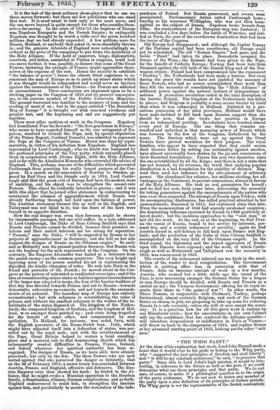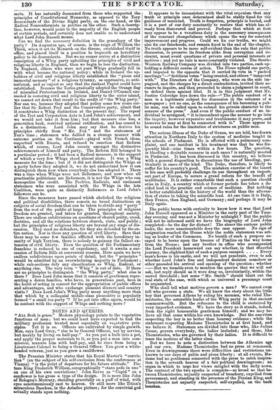" THE WHIG PARTY."
AT the close of his explanation last week, Lord john Russell made a boast that it would ever be his pride to belong to the Whig part, who " supported the just principles of freedom and civil liberty ; and " it will be my constant endeavour," he said, " to preserve that party." Since this is Lord John's high mission, it would be inte- resting, in reference to the future as well as the past, if we could determine what are those principles and that party. We do not care, of course, to make it a philological question as to the origin of the party nickname. We do not seek to fasten any member of the party upon a nice definition of its principles at former periods. The Wing party is not the representative of the Scotch conventicle sects. It has naturally descended from those who supported the principles of Constitutional Monarchy, as opposed to the Tory descendants of the Divine Right party, on the one hand, or the Radical Nonconformists in polities on the other. Such a descrip- tion, however, would point to the majority of the English people at certain periods, and certainly does not enable us to understand what Lord John Russell means.
Can we find the necessary definition in the genealogy of the party ? Its Augustan age, of course, is the reign of William the Third, when it set its Monarch on the throne, established itself in office, and placed itself in a position to bequeath an hereditary policy to its descendants. But we no sooner arrive at a distinctive conception of a Whig party upholding the principles of civil and religious liberty in England, than we begin to lose the distinction. In England, others who were not pure Whigs gradually fell in with what became the national policy; while in Ireland the up- holders of civil and religious liberty established the "pious and immortal memory " of a religious tyranny, as oppressive, as anti- national, and as unjust as any that the rankest Papist could have established. Because the Tories gradually adopted the Orange flag of miscalled Protestantism in Ireland, and Daniel O'Connell suc- ceeded in restoring civil and religious liberty to the sister island, we cannot set down that result to the credit of " the Whig party." Nor can we, because they adopted that policy some few years ear- lier that Sir Robert Peel and the Conservative party, admit that it constitutes a Whig distinction at the present day. The repeal of the Test and Corporation Acts is Lord John's achievement, and we would not take it from him ; but that measure also has, a generation back, received national ratification, and has ceased to be a distinction. Lord John may say that he derives his principles chiefly from " Mr. Fox " and the statesmen of Fox's time ; statesmen who dallied in a strange manner with extreme parties on the Continent—played with French ideas, coquetted with Russia, and refused to sanction that Reform which, of course, Lord John counts amongst the distinctive achievements of himself and party. The Reform Bill belonged to a particular period ; it had been a Radical measure, in the support of which a very few Whigs stood almost alone. It was a Whig measure for the time ; but if it did not distinguish the Whigs as a party before they adopted it, we do not understand how it can distinguish them now when everybody else has adopted it. There was a time when Whigs were not Reformers, and now when all practicable politicians are Reformers, it is not the Whigs who can monopolize the credit. The Peelites, Radicals, and unclassed statesmen who were associated with the Whigs in the late Coalition, were quite as distinctly Reformers as Lord John's followers can be.
Since the measures have passed which abolished the religions and political disabilities, there remain no broad distinctions on subjects of social freedom that can be taken to divide any " party " from the rest of the public at large. Theprinciples of religious freedom are granted, and taken for granted, throughout society. There are endless subdivisions on questions of church polity, creed, doctrine, and all the relations between church, state, and public • but the principles of religious liberty are beyond any stage of dis- cussion.. mission. They need no defenders, for they are defended by the en- tire nation. Nor is there any question of civil liberty. Save that there may be some few families afflicted with the hereditary in- sanity of high Toryism, there is nobody to gainsay the fullest ex- tension of civil liberty. Even the question of the Parliamentary franchise is reduced to one of expediency, and it awaits a suc- cession of Reform Bills at convenient seasons. Here again we have endless subdivisions upon points of detail, but the " principles " would be admitted by an overwhelming majority in Parliament ; while sub-sections defy any classification as Whig, Radical, or anything else. The very term " Whig " is out of date. If there are no principles to distinguish " the Whig party," what else is there P Does Lord John mean that it consists of gentlemen repre- senting a dozen families, who have, in generations past, been in the habit of acting in concert for the appropriation of public offices and advantages, and who exchange pleasant dinners and country its ? Does Lord John's Whig party mean anything more than that which by a colloquial middle-class pleasantry is popularly termed " a small tea-party "? If he got into office again, would he be content with the support of Whigs and nothing more ?



























 Previous page
Previous page